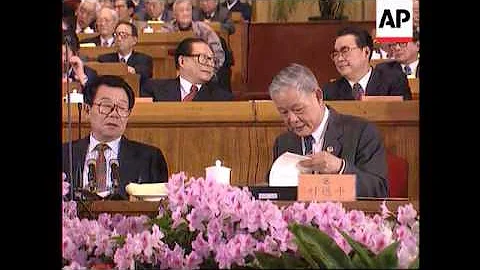In Japan's "hereditary politics", many hereditary members of Congress inherit their father's business for three or even five generations, and most members of Congress also have the status of a powerful family.
Japan's Liberal Democratic Party is even nicknamed the "hereditary party," and the status of this powerful family is even unbreakable in Japanese politics.
There are five modern Japanese political families. Among them, the Hatoyama family is the earliest political family in Japan. It helped former Japanese Prime Minister Nobusuke Kishi, and from Kishi Nobusuke, the Fukuda family, the Koizumi family, and the Abe family were established.
But although the last Aso family is also a famous political family in Japan, it has rarely appeared in Japanese politics in recent decades, and the position of Japan's prime minister is usually chosen from the other four families. But it would be a big mistake to underestimate the strength of the Aso family because of this. Let’s introduce this huge family that spans the three worlds of Japan’s military, government and business.

Shinzo Abe
The secret behind Japanese surnames
The Meiji Restoration is regarded as an important historical node for Japan to embark on the road to democracy and prosperity after the shogunate era. However, this coup did not completely Westernize Japan. After all, Japan is a traditional Eastern country that has maintained an autocratic monarchy for many years.
In terms of its attitude towards the famous families left over from the shogunate era, the new government of the Meiji era still adopted a policy of reservation and care. Therefore, the ancient family that is very famous in history has survived the changes in history in the new era.
Surnames are not just a title for Japanese people, although there are hundreds of thousands of surnames in Japan. Even as soon as the emperor issued an order, everyone in the country had a surname. However, in the minds of Japanese people, surnames are exclusive to nobles.
Retaining the noble surnames from the shogunate period is equivalent to retaining their status as nobles in the hearts of the people. For example, commoners with the four surnames Fuji, Hara, Ping, and Ju are not worthy of having them at all.
In modern society, many Japanese people basically know the identity, background and family situation of the other person as long as they hear the other person's last name.
For example: Among the five protagonists in the Japanese comic "Slam Dunk", Mitsui Kotobuki. If you know the Japanese chaebol, you must be very familiar with the surname Mitsui. This is the surname of a very famous chaebol family in Japan in modern times.

Perhaps Chinese readers will think that such an example is too far-fetched, but no one in Japan does not know what the surname "Mitsui" represents.
After the Meiji Restoration, many famous Japanese chaebols and political figures also rose up. Perhaps for Japan, a constitutional monarchy, the emperor has been in a vacuum since ancient times and has not held much real power. However, people with famous family names can cover the sky with one hand in Japan.
During World War II, Japan Emperor Showa took advantage of the young officers in the army who wanted to be promoted quickly, and began to promote militarism. After
finally established its own political system, in accordance with Japan's tradition of subordinates overcoming superiors, all cabinet ministers who disobeyed their control were ousted through assassination and political persecution. In the years after the rise of militarism, they led Many new family names were created and became the actual controllers of Japanese political power.
After that, all the ministers who controlled the political affairs of Japan's Ministry of Internal Affairs, Ministry of Finance and other provinces during World War II. As long as was not executed after World War II, almost all of them were released from prison and became a powerful political family after Japan rebuilt its cabinet.

Emperor Showa
The Rise of the Aso Family
At the end of the 19th century and the beginning of the 20th century, the Aso family gradually prospered with the basic heritage that condensed Japanese family culture. In the middle and late 20th century, the Aso family gradually stepped into into the Japanese political field. and wrote a modern history of Japan in the days that followed.
The ancestors of the Aso family were farmers who had no surname at all, but at that time, in order to protect their descendants from being bullied by the gentry class, they bought the surname "Aso" for their family.
In Japan at the beginning of the industrial revolution, a man named Taiji in Aso's family started a coal logistics business. Aso Taiji was born to do business, and began to build factories and contract mines in Kyushu and other places, and later entered the electric power and financial fields.
You must know that no matter which country you are in, those who become the giant plutocrats are often those who are in the basic resource business.. The Aso family also became one of the richest families in Japan at the time because of the family's basic resource business.
In the industrial industry from the 19th century to the early 20th century, there was extremely bloody labor exploitation at all times.

laborers
The history of the Aso family’s fortune is basically equal to the history of laborers’ blood and tears.
Due to Japan's colonial policy towards China and the Korean Peninsula at that time, the Aso family conveniently used their power to deceive a large number of workers from China and North Korea to work in Japan.
These defrauded workers often have to drill into very dangerous mines and endure harsh working conditions. They may even lose their lives at any time due to floods, fires, landslides and explosions in the mines. In order to reduce production costs, the laborers working for the Aso family could only eat two meals a day and work more than ten hours a day, but the wages were simply not enough to support the elderly and children at home.
But even this did not make the Aso family satisfied with the wealth in the business world. Aso Taiji used his abundant assets to marry into various political and military figures and cultivated a very large network of relationships. and became a member of the Japanese House of Representatives in the late 1990s.
After this, Naoro Aso, the "Goshoji" of the Aso family, was designated by the family as the descendant to inherit the family business. During World War II, Naoro Aso participated in the "Kamikaze" and was eventually destroyed in the battle. However, his death It also brought the Aso family the honor of having someone enter the Yasukuni Shrine.
Aso Naoro's brother Aso Taigaji officially became the head of the Aso family, and successfully joined the political arena with the recommendation of the family, became a member of the Liberal Democratic Party , and successfully married Prime Minister Yoshida Shigeru's daughter, , gave birth to the future 92nd Prime Minister of Japan, Taro Aso, .

Taro Aso
Taro Aso’s Journey to Prime Minister
As the eldest son of the family, Taro Aso was placed high hopes by the Aso family as soon as he was born. As the eldest son of the chaebol Aso family and the eldest grandson of Yoshida Shigeru, he has learned various matters about the family and Japanese politics from his grandfather since he was a child.
The principle of encouraging young people to grow is not for nothing. Although Taro Aso did not have good academic performance in his youth, he inherited the communication skills of his ancestors. Taro Aso's popularity among aristocratic circles is quite good. After graduating from high school, under the arrangement of his parents, he entered the Imperial Academy University to study political economy.
Four years later, he studied at Stanford University in the United States and University of London in the United Kingdom. Although he did not get a degree in the end, it still created a good resume for his future political career.
After Taro Aso returned to Japan, he joined Aso Industry Co., Ltd. Following the political path of his fathers, he was successfully elected to the House of Representatives in 1979. Afterwards, through a political marriage, he married the daughter of Zoshiyuki Suzuki, the second-generation leader of the Liberal Democratic Party. Although Taro Aso has a rich background that is unmatched by ordinary people, his character is quite hilarious.

Taro Aso
When he was young, he was uneducated but fell in love with shooting sports. In 1976, he even represented Japan in the Montreal Olympics! Of course, considering his level as an enthusiast, he only got 41st place.
And as a national politician, he was actually caught secretly reading "Rose Maid" while working.Moreover, Taro Aso is also notorious for his bad mouth. He uses his family status to offend powerful people in the governance of the House of Representatives.
In 1998, Taro Aso, who was outspoken but dressed in a ruffian style, was disliked by many people. However, he still used the huge power of the Aso family to enter the Japanese government cabinet and became the head of the Economic Planning Department. Afterwards, Taro Aso went through two failed campaigns for prime minister and gradually grasped the key to the campaign.

Aso Taro
However, Taro Aso's offending character caused him to lose to Yasuo Fukuda in the third election in an avalanche. Coincidentally, Yasuo Fukuda announced his resignation less than a year later. The Liberal Democratic Party felt that the group must be leaderless, so they had to vote urgently. Taro Aso was elected as the 92nd Prime Minister of Japan with an absolute advantage of 351 votes.
However, he lost the position of prime minister less than a year after taking office. Since his cabinet was composed of hereditary powerful people, the leader of the Democratic Party Hatoyama Yukio launched a campaign to force the Liberal Democratic Party to cede the throne due to the Nakagawa Shoichi incident. , and completely ended the fifty-year history of the Liberal Democratic Party in power in Japan.
However, the Aso family has deep roots after all. After all, Taro Aso has only suffered some setbacks at the peak of his power. The family's power is still very large in the entire military, political and business circles of Japan. Therefore, during the subsequent term of Prime Minister Shinzo Abe, Taro Aso held important positions such as Deputy Prime Minister and Minister of Finance, and as the No. 2 figure in Abe's cabinet , he became a powerful Japanese political celebrity.

Taro Aso
Other political relationships of the Aso family
In fact, the political relationship of the Aso family is not just Taro Aso alone. Other political marriages related to the Aso family are also powerful in Japanese society. For example, the sons-in-law of Taro Aso's generation are either powerful or wealthy, and even belong to the Japanese royal family.
Aso Taro's eldest sister married Soma Kazuki, the heir to Japan's Soma industrial family. You must know that the surname "Souma" has been a famous family in ancient Japan. The famous military commander Souma Mori-in in Japan's Warring States Period was a powerful name at that time. The second sister married Kiyohiko Arafune, the Japanese ambassador to Spain, and the third sister even married Prince Kanhito, the cousin of Emperor Akihito.
Such a marriage can show the strong influence of the Aso family in Japan.





















